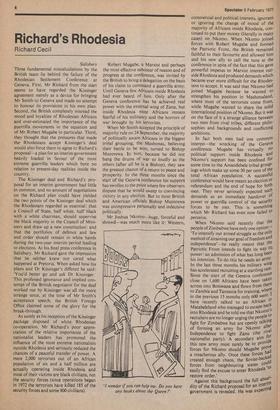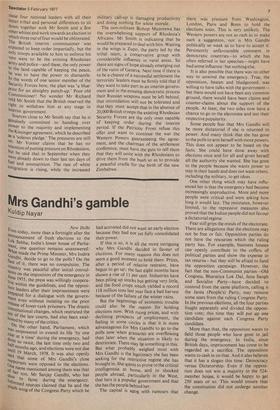Richard's Rhodesia
Richard Cecil
Salisbury Three fundamental miscalculations by the British team lie behind the failure of the Rhodesian Settlement Conference at Geneva. First, Mr Richard from the start seems to have regarded the Kissinger agreement merely as a device for bringing Mr Smith to Geneva and made no attempt to honour its provisions in his own plan. Second, the British completely misread the mood and loyalties of Rhodesian Africans and over-estimated the importance of the guerrilla movements in the equation and of Mr Robert Mugabe in particular. Third, they thought that the pressures that made the Rhodesians accept Kissinger's deal would also force them to agree to Richard's proposal—a plan for an interim government heavily loaded in favour of the most extreme guerrilla leaders which bore no relation to present-day realities inside the country.
The Kissinger deal and Richard's proposal for an interim government had little in common, and no amount of negotiations on the Richard plan could have yielded the two points of the Kissinger deal which the Rhodesians regarded as essential: that a Council of State, half white, half black with a white chairman, should supervise the black majority in the Council of Ministers and draw up a new constitution: and that the portfolios of defence and law and order should remain in white hands during the two-year interim period leading to elections. At his final press conference in Salisbury, Mr Richard gave the impression that he neither knew nor cared what happened at Pretoria. When asked how his plans and Dr Kissinger's differed he said: 'You'd better go and ask Dr Kissinger.' This professed ignorance and implied contempt of the British negotiator for the deal worked out by Kissinger was all the more strange since, at the time of Mr Smith's acceptance speech, the British Foreign Office claimed some of the glory for the break-through.
As surely as his reception of the Kissinger package disposed of white Rhodesian co-operation, Mr Richard's poor appreciation of the relative importance of the nationalist leaders has promoted the influence of the most extreme nationalists outside Rhodesia and seriously reduced the chances of a peaceful transfer of power. A mere 2,000 terrorists out of an African population of six and a half million are actually operating inside Rhodesia and most of their victims are black civilians, not the security forces (since operations began in 1972 the terrorists have killed 185 of the security forces and some 900 civilians). Robert Mugabe, a Marxist and perhaps the most effective saboteur of reason and of progress at the conference, was invited by the British to bring a delegation on the basis of his claim to command a guerrilla army. Until Geneva few Africans inside Rhodesia had ever heard of him. Only after the Geneva conference has he achieved real power with the external wing of Zanu, but inside Rhodesia most Africans remain fearful of his militancy and the horrors of war brought by his terrorists.
When Mr Smith accepted the principle of majority rule on 24 September, the majority of politically aware Africans in the biggest tribal grouping, the Mashonas, believing their battle to be won, turned to Bishop Muzorewa. In him, because he did not bang the drums of war so loudly as the others (after all he is a Bishop), they saw the greatest chance of a return to peace and prosperity. In the three months since the start of the Geneva conference his support has swollen to the point where few observers dispute that he would sweep to convincing victory in any election. But to most British and American officials Bishop Muzorewa was unimpressive personally and indecisive politically.
Mr Joshua Nkomo—huge, forceful and shrewd—was much more like it: Western,
Spectator 5 February 1977 commercial and political interests, ignorant or ignoring the change of mood of the majority of Africans inside Rhodesia, continued to put their money (literally in many cases) on Nkomo. When Nkomo joined forces with Robert Mugabe and formed the Patriotic Front, the British remained faithful to their favourite and allowed him and his new ally to call the tune at the conference in spite of the fact that this gave powerful impetus to Marxist interest outside Rhodesia and produced demands which became ever more difficult for the Rhodesians to accept. It was said that Nkomo had joined Mugabe because he wanted to strengthen his position in Mashonaland, where most of the terrorists come from, while Mugabe wanted to share the solid international position of Nkomo. But it was on the face of it a strange alliance between two men from rival tribes, different philosophies and backgrounds and conflicting ambitions.
In fact both men had one common interest--the wrecking of the Geneva conference. Mugabe has virtually no political support inside Rhodesia and Nkomo's support has been confined for some time to the Amandebele tribal grouPings which make up some 30 per cent a the total African population. A successful conference would have meant an election or referendum and the end of hope for both men. They never seriously expected such demands as an immediate handover of power or guerrilla control of the securitY forces to be met. This is something which Mr Richard has even now failed to perceive. When Nkomo said recently that the people of Zimbabwe have only one option-'To intensify our armed struggle as the on method of attaining our goal of freedom and independence'—he really meant that the Patriotic Front intends to fight its way t01 power: an admission of what has long been his intention. To do this he needs an arrnY' In the last three months his military wins has accelerated recruiting at a startling rate. Since the start of the Geneva conference close on 1,600 Africans have been taken across into Botswana and flown from there to Zambia and Tanzania for training, where., in the previous 15 months only 600 went.. have recently talked to an African In Matabeleland who managed to escape back into Rhodesia and he told me that Nkom° s
t recruiters are no longer urging the peuPle fight for Zimbabwe but are openly
talk of forming an army for Nkomo afte. Independence to fight Zanu (the riv,.alr 'nationalist party).. A secondary aim 1.°,_ this new army must surely be to P forces for Nkomo should Mugabe pro a treacherous ally. Once the—se forces ha created enough chaos, the Soviet-backeo. forces from neighbouring states could easily find the excuse to enter Rhodesia t° restore order.' Against this background the full ahstIP dity of the Richard proposal for an inteetritg government is revealed. He was exve these four national leaders with all their bitter tribal and personal differences to sit down together with Mr Smith and a few Other whites and work towards an election in Which three out of four would be obliterated. The British interim commissioner was expected to keep order impartially, but the only troops available to him to enforce his veto were to be the existing Rhodesian a.rmy and police—and these, the only power In the land capable of keeping the peace, he was to have the power to dismantle. In the words of one senior member of the Security Forces here, the plan was 'a blueprint for an almighty punch-up.' Poor old Commissioner! No wonder Mr Richard told Mr Smith that the British reserved the tight to withdraw him at any stage in interim government.
Sources close to Mr Smith say that he is genuinely committed to handing over Power to the majority and implementing the Kissinger agreement, which he described as a 'solemn pledge.' The pressures are still 9. Mr Vorster claims that he has no Intention of putting pressure on Rhodesians, but he said that in September when they Were already down to their last ten days of fuel and ammunition. The rate of white emigration is rising, while the increased
military call-up is damaging productivity and doing nothing for white morale.
The non-militant Bishop Muzorewa has the overwhelming support of Rhodesia's Africans. Mr Smith is indicating that he would be prepared to deal with him. Waiting in the wings is Zupo, the party led by the tribal team, a conservative group with considerable influence in rural areas. So there are signs of hope already emerging out of the ruins of Geneva. Next time if there is to be a chance of a successful settlement the terrorists' leaders must be firmly told that if they want to take part in an interim government and in the ensuing democratic process their Russian weapons must be left behind, that intimidation will not be tolerated and that they must accept that in the absence of 10,000 British troops the existing Rhodesian Security Forces are the only ones capable of keeping order during the interim period. If the Patriotic Front refuse this offer and want to continue the war the Western Powers guaranteeing the agreement, and the chairman of the settlement conference, must have the guts to tell them that they will unite with the Rhodesians to drive them from the bush so as to provide a peaceful cradle for the birth of the new Zimbabwe.



































 Previous page
Previous page